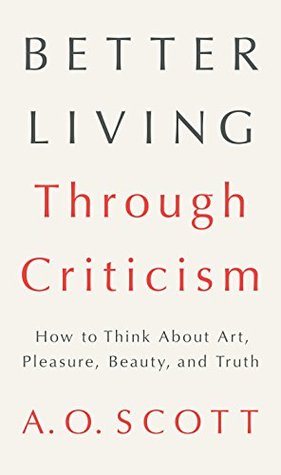For a book with “how” in the title, there is not much instruction. Better Living Through Criticism is more of a “watch me think about art, pleasure, beauty, and truth” which is much more entertaining. If writing described as “pontificating” or “a meditation” does not immediately turn you off, you will probably enjoy A.O. Scott’s reference-filled critique on the practice itself.
Imagine sitting at an outside cafe on a brisk autumn Sunday morning, steam rising from three coffee cups as you look across the cold, green, metal table at your Uncle A and your other Uncle O. They both super smart, well read, and are going through a sort of mid-life crisis, questioning everything. Also, the only way they can communicate is in references, stringing together literary quotations like a pair of (Philadephia-based) conspiracy theorists. Furthermore, they have been meeting here every Sunday for weeks and still haven’t come up with any solution. But there have been lots of conclusions.
To some, this might be the worst kind of excuse-inducing scenario. I would immediate pull up my chair and take an expectant sip of coffee.
Each chapter takes on a fundamental topic (What is criticism? What is the role of the audience? What is the role of the critic? What is the business of criticism?) and is interleaved by conversational asides where Scott interviews himself, revealing more of his thinking in a sort of disarming, conversational way. (Chapter summaries here)
Although at some points the book feels like a drawn out magazine article, I do appreciate the philosophical approach he takes on the topics he covers. Although I do a lot of book and movie reviews, I have never really considered myself a critic. Better Living Through Criticism did make me think more seriously about my approach. I attempt to read every book with a critical eye and engage with the ideas within when I write about it. I want to add value, above and beyond any value judgement. This is the result of the “thinking” that goes both into criticism as into writing. A.O. Scott quotes Elizabeth Hardwick in the inaugural New York Review of Books:
“[T]he great difficulty is making a point, making a difference—with words.”
H.L. Mencken declared that any good critic was motivated to “make an articulate noise in the world.” This advice I took to heart, but I was struck by Scott’s definition that “a critic is a person whose interest can help to activate the interest of others.” Of course this does not mean a critic should “sell” the work. Scott returns often to the “struggle between criticism and publicity” throughout: critics shouldn’t be PR or marketing, nor should they hack down everything. For Scott, if he doesn’t like a work, “the only ethical and honest course of action for me would be to remain silent and leave the discussion to others.” (I have not always followed this advice, but as you can see I read many more books than I review). For the works that are worthy, one task of the critic is to re-create their experience of the work to the reader. Scott describes a budding cineast who “dreams of casting a spell like the one he finds himself under.” Critics are artists too.
Better Living Through Criticism didn’t give me a map, but certainly gave me a destination to strive towards in my own practice of criticism. There are many ideas in the book to grapple with and I have a stack of notes that I will return to. Also, there are many referenced works for me to look up and appreciate next. To better living!


